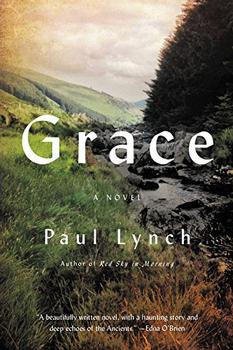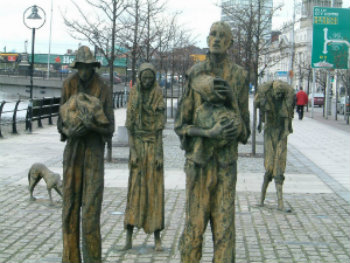Summary | Excerpt | Reviews | Beyond the Book | Read-Alikes | Genres & Themes | Author Bio

This article relates to Grace
Grace is set in an Ireland devastated by The Great Hunger—the potato famine of 1845-1852, which occurred when three successive harvests failed due to blight, causing a million people to starve to death and at least as many to emigrate for a better life. Ireland, Britain and America have all been shaped by its political, economic and social effects.
The blight, Phytophthora infestans — literally "infesting plant destroyer" — had arrived in Ireland from the Americas many years earlier but its impact would not have been disastrous had it not been for the confluence of two factors: unusually cool, wet weather for consecutive years, and the population's heavy reliance on two potato varieties particularly prone to the blight.
All the rural poor, half of Ireland's population, ate potatoes almost exclusively for eight months of the year. This was because much of the land was worked by poor tenant farmers who needed a crop to sustain their family in winter and spring, and also to pay the high rents demanded by their English landlords. Potatoes yielded well and satisfied hunger—a person might eat ten pounds of the tuber a day!
 Ireland had done well with this crop. Then came the blight worsened by the rains. Across the country, whole fields of potatoes rotted in just days. At the time, Ireland was part of the United Kingdom. The British government did execute some relief measures to mitigate the impacts of the crop failures, providing cornmeal for example, but these were minimal and ineffective. Had the British been more determined to look beyond mere charity and instead institute meaningful policy changes such as repealing trade tariffs and making landlords responsible for the well-being of their tenants, history might have been different. Ireland did have sufficient food to feed the population but greedy landowners insisted on exporting it for better profits, and the government did not impose a ban on exports as they had during an earlier famine. When the potato crop failed again and again, the subsistence farmers who'd rented land from their landowners were evicted. Estimates of the numbers who starved vary widely but were probably around one million people, approximately 12% of the population. Many others emigrated, with most going to England, Canada and the USA. In 1890 it is estimated that 40% of Irish-born people were living abroad.
Ireland had done well with this crop. Then came the blight worsened by the rains. Across the country, whole fields of potatoes rotted in just days. At the time, Ireland was part of the United Kingdom. The British government did execute some relief measures to mitigate the impacts of the crop failures, providing cornmeal for example, but these were minimal and ineffective. Had the British been more determined to look beyond mere charity and instead institute meaningful policy changes such as repealing trade tariffs and making landlords responsible for the well-being of their tenants, history might have been different. Ireland did have sufficient food to feed the population but greedy landowners insisted on exporting it for better profits, and the government did not impose a ban on exports as they had during an earlier famine. When the potato crop failed again and again, the subsistence farmers who'd rented land from their landowners were evicted. Estimates of the numbers who starved vary widely but were probably around one million people, approximately 12% of the population. Many others emigrated, with most going to England, Canada and the USA. In 1890 it is estimated that 40% of Irish-born people were living abroad.
Filed under People, Eras & Events
![]() This "beyond the book article" relates to Grace. It originally ran in August 2017 and has been updated for the
June 2018 paperback edition.
Go to magazine.
This "beyond the book article" relates to Grace. It originally ran in August 2017 and has been updated for the
June 2018 paperback edition.
Go to magazine.






Your guide toexceptional books
BookBrowse seeks out and recommends the best in contemporary fiction and nonfiction—books that not only engage and entertain but also deepen our understanding of ourselves and the world around us.